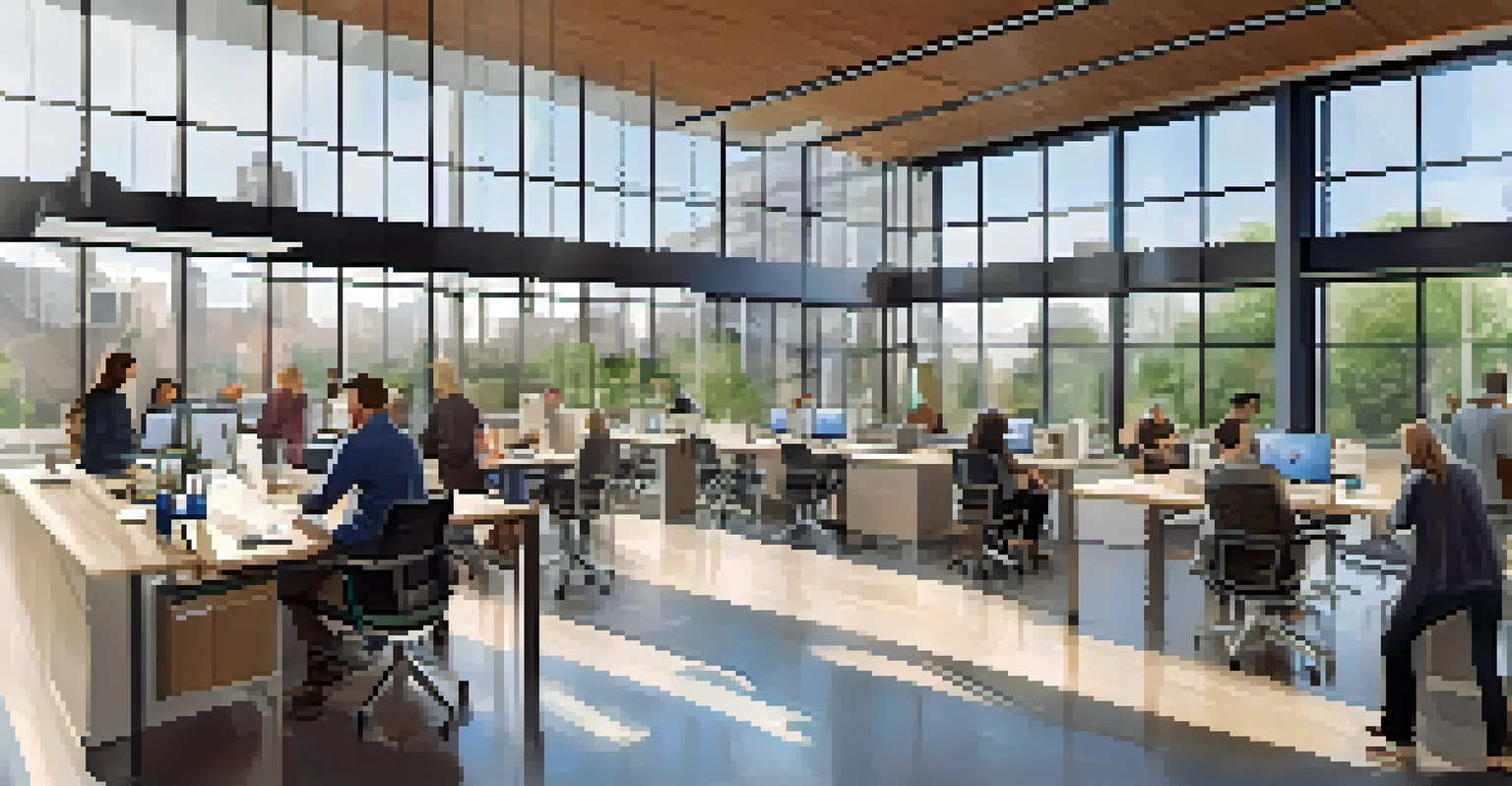How Philadelphia Universities Shape Local Economic Development

The Role of Universities in Economic Development
Universities play a pivotal role in shaping local economies, serving as hubs of innovation and workforce development. In Philadelphia, institutions like the University of Pennsylvania and Temple University contribute significantly to job creation and economic stability. These universities not only provide education but also foster research that leads to new businesses and industries.
Universities are the engines of innovation and the drivers of economic growth.
Through their research initiatives, universities attract funding and investment, which further stimulates the local economy. For example, the creation of technology transfer offices helps commercialize research, turning groundbreaking ideas into viable products and services. This synergy between academia and industry is vital for economic growth.
Moreover, universities offer valuable resources to local entrepreneurs, including mentorship, incubators, and access to cutting-edge technology. By nurturing startups and small businesses, they help diversify the local economy and create a vibrant entrepreneurial ecosystem.
Job Creation and Workforce Development
One of the most direct impacts of universities on local economies is job creation. Educational institutions not only employ thousands of faculty and staff but also generate jobs in various sectors, including healthcare, technology, and services. This influx of employment opportunities is crucial for maintaining economic resilience.

Moreover, universities are instrumental in workforce development by tailoring educational programs to meet local industry needs. For instance, partnerships between universities and businesses ensure that students graduate with relevant skills that align with job market demands. This alignment helps reduce the skills gap and boosts employability for graduates.
Universities Drive Economic Growth
Universities act as innovation hubs, creating jobs and stimulating local economies through research and development.
Internship and co-op programs further enhance this connection by providing students with real-world experience, while simultaneously benefiting local businesses. These mutually beneficial relationships foster a skilled workforce ready to contribute to the local economy.
Attracting Investment and Talent
Philadelphia universities are magnets for both investment and talent, drawing individuals and businesses looking to thrive in a vibrant environment. The presence of renowned institutions enhances the city's reputation as a center for education and innovation, making it attractive to investors. This influx of capital is crucial for funding local projects and initiatives.
The future of our economy depends on the strength of our universities and their ability to engage with local communities.
Additionally, universities attract a diverse pool of students from around the world. This influx of talent enriches the local culture and economy, as many graduates choose to stay in the city after completing their studies. Their fresh perspectives and innovative ideas contribute to the dynamism of the local workforce.
Furthermore, events such as conferences, workshops, and networking opportunities hosted by universities create avenues for collaboration between local businesses and academic experts. This exchange of ideas can lead to new ventures and partnerships that stimulate further economic growth.
Innovation and Technology Transfer
Innovation is at the heart of economic development, and universities are key drivers of this process. Through research and development initiatives, institutions in Philadelphia are at the forefront of technological advancements that can transform industries. Their research often leads to breakthroughs that can be commercialized, resulting in new products and services.
Technology transfer offices play a crucial role in this process by facilitating the movement of innovations from the lab to the marketplace. These offices help researchers patent their inventions and connect them with businesses that can bring these ideas to life. This collaborative approach not only benefits the university but also fuels local economic growth.
Talent Attraction and Retention
Philadelphia's universities attract a diverse pool of students, enriching the local workforce and culture.
Moreover, the establishment of innovation hubs and incubators within universities provides vital support to startups and entrepreneurs. These spaces encourage creativity and collaboration, enabling new ideas to flourish and contribute to the local economy.
Community Engagement and Support
Philadelphia universities are deeply invested in their communities, often engaging in initiatives that address local challenges. Many institutions offer programs that support community development, health, and education, fostering a strong relationship with the neighborhoods they serve. This engagement is essential for building trust and collaboration between universities and local residents.
By offering resources such as tutoring, health services, and workshops, universities contribute to improving the quality of life for community members. For instance, outreach programs often target underserved populations, providing them with access to educational opportunities and resources they might otherwise lack.
This commitment to community engagement not only enhances the social fabric of the city but also creates a more educated and capable workforce, which is beneficial for economic development.
Cultural and Recreational Contributions
In addition to their economic impact, universities in Philadelphia contribute to the cultural richness of the city. Many institutions host events, exhibitions, and performances that are open to the public, enriching the local cultural landscape. These activities attract visitors from beyond the region, contributing to the local economy through tourism.
Furthermore, universities often partner with local organizations to promote arts and culture, creating vibrant community spaces that enhance the quality of life. This focus on cultural development fosters a sense of pride and identity among residents, which can lead to increased community investment.
Community Engagement Initiatives
By addressing local challenges and providing resources, universities strengthen community ties and improve quality of life.
The recreational facilities and programs offered by universities also benefit the local population. From sports events to public lectures, these offerings create opportunities for community engagement and leisure, further solidifying the connection between universities and the local economy.
Challenges and Opportunities Ahead
While Philadelphia universities have a significant positive impact on local economic development, they also face challenges that need addressing. Issues such as funding cuts, competition for resources, and evolving educational demands can hinder their ability to contribute effectively. It's crucial for these institutions to adapt and innovate continually.
Opportunities abound for universities to strengthen their role in economic development. Collaborations with local governments and businesses can lead to new initiatives that benefit both students and the community. Embracing technology and online education can also expand access and reach, preparing more individuals for the workforce.

By addressing these challenges and seizing opportunities, Philadelphia universities can continue to be vital players in the city's economic landscape, driving growth and innovation well into the future.